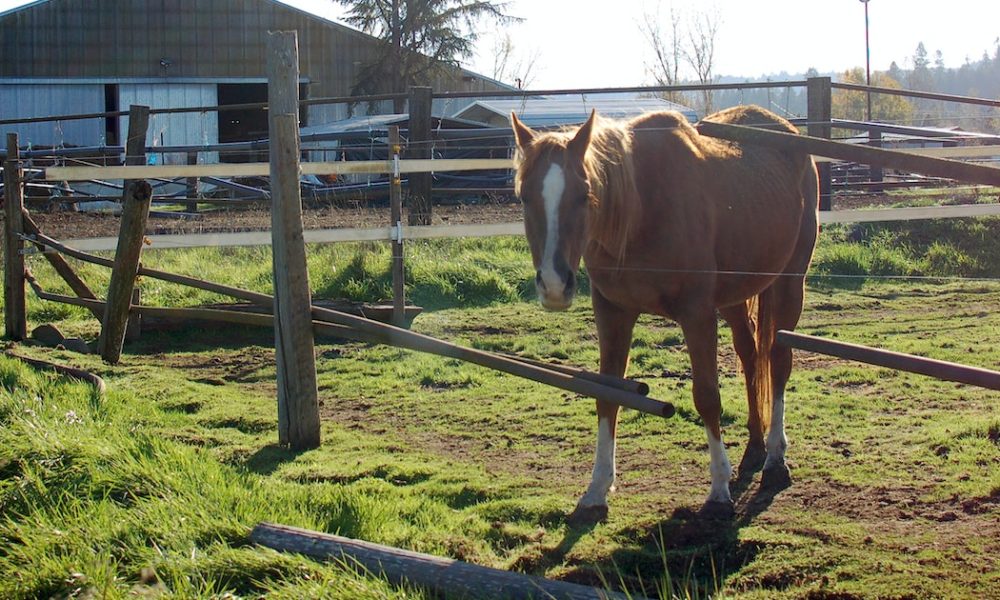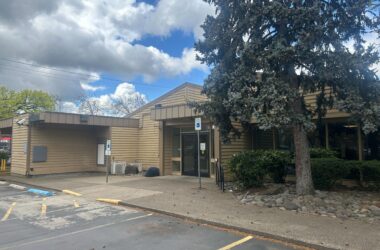 A horse at Gwen Davies’ property on Camas Swale Road looks over a broken fence in the backyard during the horse seizure in October 2019. Erin Tierney/The Chronicle
A horse at Gwen Davies’ property on Camas Swale Road looks over a broken fence in the backyard during the horse seizure in October 2019. Erin Tierney/The Chronicle
Key terms of deal
• Five-year probation, during which time Gwenyth Davies cannot own more than four horses at a time.
• Restricted from possessing or being in the physical care of any other horses, including boarded horses.
• Monthly photos requires of her horses and allow officials to evaluate all animals
• Ordered to pay a total restitution of $49,557.36.
CRESWELL – A Creswell horse trainer last week pleaded guilty to 11 counts of animal neglect after 61 severely neglected horses were seized from her property in October last year.
Gwenyth Davies, 49, of 3305 Camas Swale Road, pleaded guilty on Feb. 4 to second-degree misdemeanor charges. She will be on probation for five years, during which time she cannot own more than four horses at a time.
”This is not a ‘token’ guilty plea in any sense of the word,” said Deputy District Attorney Jacob Kamins, the case’s special prosecutor, from the Benton County District Attorney’s Office.
The plea agreement allows the State to place restrictions on Davies regarding horse ownership, which may not have been possible if the case had gone to trial, said Kamins, who specializes in animal cruelty cases across the state.
Kamins began negotiations with Davies’ attorney, Laurie Fine, a couple days after the seizure and worked to file charges ”reflective of the true breadth of Davies’ criminal behavior.” The parties came to a full resolution between cases prior to even filing the charges, he said.
Attempts to reach both Davies and Fine were not successful by presstime Tuesday.
”What I looked at, generally speaking, was the early acceptance of responsibility and the lack of criminal history leading up to this incident,” Kamins said, noting that if a defendant is willing to take responsibility, charges can be dismissed or reduced from felonies to misdemeanors.
He said that Davies accepted responsibility early on. Furthermore, there is no indication of any past convictions.
The Chronicle has been contacted by several people who allege similar behavior in California in the years leading up to Davies’ move to Oregon. Kamins said he is aware of the allegations made by people in California, and was unsuccessful in substantiating the accusations and locating any previous charges against Davies in any state.
He said that while Fine did a good job ”painting a picture of what Davies intended to do, of course we have to make decisions about the actual results. When the vet went through the scene and further examined all the animals, she felt that they were largely not receiving care.”
Sixty of the 61 horses were taken to Sound Equine Options (SEO), a licensed rescue located outside of Portland.
Upon arrival, the horses were lethargic and ”checked out,” with big, black dead eyes, as though the light in their eyes had burnt out, said Kim Mosiman, SEO executive director. ”The horses were just focused on surviving; they had become very internal at that stage,” Mosiman said. Three of the horses were in such poor health that they did not survive.
This is the first time SEO came to Lane County in their 10 years of operation and it is the largest rescue they’ve been involved in; the second largest having been in Linn County with 34 horses rescued.
”This is by far the largest horse rescue in Lane County history, certainly within the last 30 years,” Lane County Public Information Officer Devon Ashbridge said, noting the only other comparable instance was in January 2018 when eight horses were seized from another Creswell farm.
Thirty-seven horses ranked in a body score of three or under (the healthy range is between four and seven). Nineteen horses were ”walking skeletons” and listed in the lowest health categories, Mosiman said. ”One horse was basically the skinniest it could be and still be alive.”
It took some horses up to a month for that light in their eyes to flicker again, though it is unknown the damage done to their internal organs, she said.
By pleading guilty to multiple counts of animal neglect in the State of Oregon, Davies will have to wait 10 years before that information can be expunged from her records. Also, for each of the 11 counts, Davies ”has six months worth of jail time hanging over her head during probation,” Kamins said.
The agreement also restricts Davies from possessing or being in the physical care of any other horses, including boarded horses. Davies must provide Lane County Animal Services and the Oregon Humane Society with monthly photos of her horses and allow officials to evaluate all animals on the property.
Davies is also ordered to pay a total restitution of $49,557.36 – $18,540.07 to Oregon Humane Society, $10,637.90 to Lane County and $20,379.39 to SEO – for costs related to the care of the seized horses.
If there is no criminal record and there is nothing about the case that makes it worse than the average version of that crime, the judge is instructed to put the person on probation for three years; however, if a person is convicted of a second or third level misdemeanor, judges have discretion to put the person on up to five years of probation, Kamins said.
”People assume that when someone is convincted of animal cruelty, they are not allowed to own animals,” but there are exceptions, he said, noting that the animal prohibition does not apply to a person’s first conviction if the person is the owner of a commercial livestock operation and if the violation was committed against said livestock.
”Judges have a significant amount of discretion,” and could either enforce the exception to the law or forgo it, he said. ”In this case, because of that uncertainty coupled with early acceptance of responsibility, it seemed strategically and functionally advantageous to put together a deal where both sides were asking a judge to do a resolution in this way,” he said. ”The judge agreed and now (Davies) is subject to way more significant restrictions than could have happened if the case went to trial, even on felony counts.”
Most of the remaining horses that had been boarded on the property were returned to their owners after the horses were medically stable, and some were surrendered.
Davies signed six horses over to SEO, Mosiman said, and three other boarded horses were signed over from their owners.
Four horses are still being held pending the resolution of criminal charges against their owners, Raina and Erica Ott, who also lived at the property. Mosiman said in addition to those four horses, they have three other horses that belong to the Otts that haven’t been picked up.
”Ethically and morally, I do not believe that Ms. Davies should ever own a horse, but we have to help motivate the law to change,” she said. ”I don’t think people should be upset with law enforcement or DA; they did a good job with the laws they had to work with,” Mosiman said. ”There are some laws that came to our attention during this case that we need to change and are trying to change because of it,” she said.
Mosiman said that she was pleased to see the county pursue criminal charges in this case. ”It shows that they take this sort of thing seriously, and if these cases are not pursued criminally, it will become a repetitive problem,” she said.
”One of the main goals in this case was to ensure this type of neglect doesn’t occur again, and this agreement allows for a level of oversight that can aid in achieving that goal,” said LCSO Sheriff Cliff Harrold.







